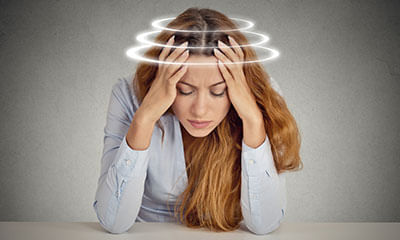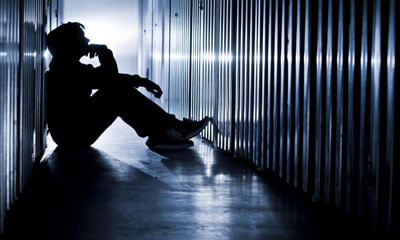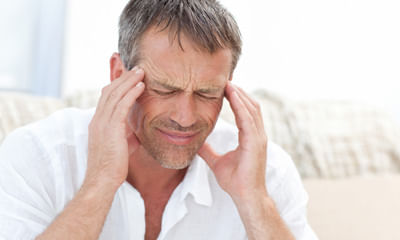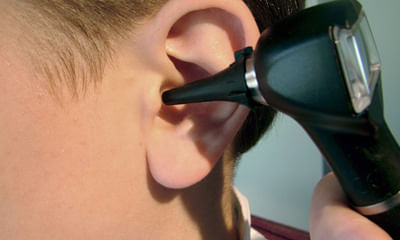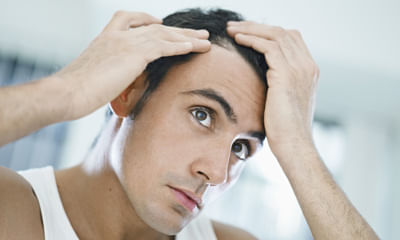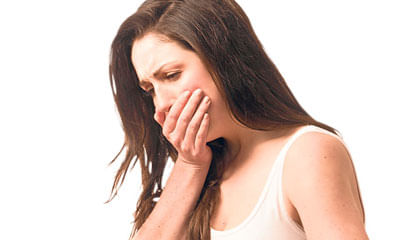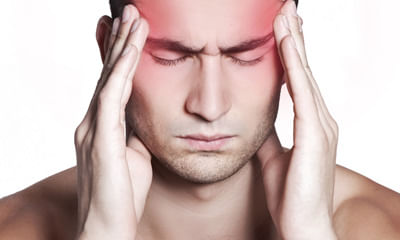Severe Vertigo And Vomiting
Hello my wife was suffering from severe dizziness, vomiting and diarrhea. After we took her to general physician. He sai ...
Ask Free Question
Follow these herbal combinations for complete cure brahmi vati 1 tablet twice a day vyadhi har rasayan 125 mg twice a day gulmkalanal avleh 10 gm twice a day chandanadi avleh 10 gm twice a day.
Doctor I am 38 (f) I am going under a lot of stress these days due to my office. For the past few months I have noticed ...
Ask Free Question
Usually self-diagnosable Migraine headaches can cause throbbing in one particular area that can vary in intensity. Nausea and sensitivity to light and sound are also common symptoms. People may experience: Pain areas: in the eyes, face, or neck Pain types: can be dull Headache: can be acute, frequent, or throbbing Visual: sensitivity to light, distorted vision, or seeing flashes of light Whole body: dizziness, light-headedness, or malaise Sensory: aura or sensitivity to sound Gastrointestinal: nausea or vomiting Also common: irritability, nasal congestion, or scalp tenderness
My father, who is 60 year old, experiences vertigo, vomiting and sweating. These suddenly happens at night and in the in ...
Ask Free Question
Hello lybrate-user, hope you are safe. Yes, it is safe to take verbet 16 regularly if there no other co-morbiditiee and a good renal function. I am sure you docote would have taken all the factors into consideration before prescribing verbet. Incase you wish to get a second opinion for the diagnosis and management of your father's vertigo, you can always reach out to us for a thorough consultation. Vertigo is a very nagging symptom and needs accurate diagnosis and treatment.
Female married patient ,age 27 ,gall bladder removed last 2 years back, from last 6 months she is using period regular t ...
Ask Free Question
It can be because of many reason from simple reasons like not sleeping on time or sleeping too much, stress, have long hours of fasting, dehydration to causes like sinusitis, migraine, high blood pressure, tumor etc. Do this 1. Take adequate night sleep 2. Eat at regular intervals. As starvation/gas can trigger headache 3. Avoid things that can trigger headache. Common triggers include alcohol, caffeine or poor sleep. Inculcate good sleep practices like having a regular bedtime schedule and avoiding naps, caffeine and TV before bedtime. 4. Don't take stress- Pursue an enjoyable activity or verbalising frustration to reduce stress and improve mental health. 5. Avoid foods that you know triggers your headache. 6. Hot packs and heating pads can relax tense muscles. Warm showers or baths may have a similar effect 7. Drink water. âDehydration can be a big cause of headaches,â For this homeopathic treatment is very effective For more details you can consult me.
Sir, mujhe 4 month se menier disease problem he ent walo se be dikhya par muje relief ne he. ...
Ask Free Question
Meniere's disease is an inner ear disease that typically affects one ear. This disease can cause pressure or pain in the ear, severe cases of dizziness or vertigo, hearing loss and a ringing or roaring noise, also known as tinnitus. Drugs for motion sickness or nausea may help manage symptoms. Your doctor may prescribe medications to take during a vertigo episode to lessen the severity of an attack: motion sickness medications, such as meclizine or diazepam (valium), may reduce the spinning sensation and help control nausea and vomiting.
I frequently feel dizzy. I feel too weak. What can be the reasons for this and please do tell some suggestions to overco ...
Ask Free Question
Labyrinthitis inner ear infection affect your hearing and balance can lead to severe form of dizziness called vertigo, this inner ear infection is generally viral, harmless and usually goes 1-6 weeks.
Sir I feel like chakkar but never fall .when I stand or sit for long I feel chakkar like unable to concentrate in any th ...
Ask Free Question
Vertigo is a specific type of dizziness. It is the medical term for the form of dizziness that involves a person having a strong sense that they, or their surroundings, are moving when they are standing still. The sense of movement has a spinning, swaying or revolving nature to it. Less commonly, people might feel as if they are being pushed forward or as if they are falling. Vertigo is not a fear of heights. However, some people might experience the symptoms of vertigo when looking down from a great height. Other symptoms that may come alongside vertigo are feeling sick or being sick, dizziness and loss of balance. Causes of dizziness what conditions and diseases can cause dizziness? Many different conditions can cause dizziness or sensations of being off-balance, for example, certain heart conditions, or blood disorders like anaemia. However, if you have been referred to a neurologist or an otologist, general conditions like these will usually have already been ruled out. Dizziness is also the unwanted side effect of many different medications. You should discuss any concerns you have about medication with your gp or pharmacist. Travelling by road, rail, air or sea can cause motion or travel sickness. The common symptoms are dizziness, nausea (feeling sick) and vomiting (being sick). Stress or anxiety being stressed, anxious, tense or irritable can also provoke dizziness or a sense of imbalance. This can lead to a vicious circle effect as feeling dizzy in itself can lead to feeling stressed, anxious or depressed. Meditation has been known to help with anxiety and stress, as well as talking to a psychologist or having cbt therapy. Prioritising your own relaxation time can also relieve signs of stress. Things such as exercising, taking a walk in nature, having a relaxing bath, or listening to a calming piece of music, may help to relax you. Some people also find aromatherapy helps them relax – lavender is a popular fragrance, although this might make you sleepy. It is important to note that different people find different activities relaxing, so do what best suits you. 15 low blood sugar level (hypoglycaemia) low blood sugar (glucose) levels can lead to dizziness – this is because your body doesn’t have the energy it needs to function properly. This is most common in people with diabetes. If someone with diabetes misses a meal, exerts themselves too much, or takes too much insulin, this may lead to low blood sugar. Symptoms of low blood sugar are feeling hungry, trembling or feeling ‘shaky’, and sweating. In severe cases you may lose consciousness. To treat low blood sugar levels, you should eat or drink something sugary, for example some sweets or a glass of fruit juice. Dehydration or heat exhaustion when your body does not have as much fluid as it needs, this disturbs the balance of salts and sugars, which then affects the way it functions. Symptoms of dehydration are feeling thirsty, lightheaded (dizzy), passing dark coloured strong-smelling urine, and passing urine less frequently than normal. If you are dehydrated, you should drink plenty of fluids, but try to avoid caffeine or fizzy drinks. Sipping small amounts regularly may be best if you are suffering from a stomach upset at the same time. Heat exhaustion occurs when there is low blood pressure and blood volume. This can occur after being exposed to heat for a long time. Symptoms include nausea, feeling faint and sweating heavily. If someone is suffering from heat exhaustion they should be taken to a cool place with any unnecessary clothing removed, and provided water to drink. They should feel better within approximately 30 minutes. 16 postural hypotension (low blood pressure) people with low blood pressure can be affected with dizziness after changing positions, such as standing up. This is more common in older people. Low blood pressure occurs when the blood pressure in your arteries is unusually low. If your blood pressure drops too low, not enough blood can reach your brain and this may lead to dizziness or light-headedness, or fainting. Some symptoms of low blood pressure are dizziness, loss of balance, fainting, blurred vision, a rapid or irregular heartbeat, confusion, nausea, and general weakness. Low blood pressure only needs to be treated if it is showing symptoms. Very few people are given medication to treat low blood pressure. Instead, life style changes can relieve symptoms. These include; standing up slowly, avoiding standing for long periods, wearing support stockings, limiting intake of alcohol, avoiding caffeine in the evening and eating smaller, more regular meals as opposed to large meals. Vestibular neuritis (labyrinthitis) vestibular neuritis is a viral infection of the inner ear (it is sometimes called labyrinthitis or viral labyrinthitis). Some specialists think that the problem is specifically with the nerve cells or neurons in the inner ear. Infections of the ear are usually viral and less commonly bacterial. Symptoms include a sudden onset of dizziness with a spinning sensation (vertigo), accompanied by nausea (feeling sick) and general unsteadiness. You may also experience problems with vision, hearing and causes of dizziness 17 concentration. These symptoms often develop a few days or weeks after a bad cold or influenza (the ‘flu). The initial dizziness caused by vestibular neuritis can be intense and very distressing. For the small number of people who experience prolonged or recurrent symptoms, the dizziness is not usually as intense but might be enough of a nuisance to affect their everyday lives. Depression, panic attacks, anxiety and derealisation (where your sense of reality seems ‘unreal’ or distorted) are also relatively common side effects of the disorder. If you are struggling with these issues, then your gp may refer you for counselling. Cbt is known to help, as well as relaxation techniques and meditation. For further information, see our ‘useful contacts’ section on page 40. People with vestibular neuritis often prefer to stay in bed because any movement makes the dizziness worse. You may find working difficult due a persistent feeling of ‘haziness’ or disorientation. The symptoms might last for just a few days but, in some cases, can persist for several weeks. Some people remain a little unsteady afterwards but most make a full recovery. Only a minority of people with vestibular neuritis will experience persistent, troublesome dizziness or suffer recurrences of the condition. Recurrences might be spontaneous or associated with further colds or bouts of influenza. Vestibular neuritis does not cause hearing problems. If the symptoms do not resolve completely and are still troublesome then you may be referred to an expert physiotherapist for vestibular rehabilitation. Causes of dizziness 18 the main treatment for vestibular neuritis, in its initial stage, is antivertigo drugs. These are the same type of drugs as those used to treat motion or travel sickness. Less common is ‘suppurative labyrinthitis’. This is caused by bacterial organisms infecting the labyrinth. The infection originates either in the middle ear or in the cerebrospinal fluid, as a result of bacterial meningitis.
I have severe problem of cervical. I feel chakkar, vomiting, severe pain in neck and shoulder. What should I do? ...
Ask Free Question
Physiotherapy treatment and stretching exercises. Neck and shoulder isometrics exercise tk traction therapy in vertigo. About toward bending.
I have headache from past five years I have been consulting so many doctors but I am still suffering with severe headach ...
Ask Free Question
Mr. lybrate-user, there are so many causes of headache, like weak eye sight, sinusitis, migraine, stress, disturb sleep etc detail history is required for proper medication. Like symptoms associated with headache like nausea, vomiting, vertigo, Nasal blockage, rhinitis etc. But just simple things you can start before proper consultation have good motion clearance, no gaseous distension these increases headache good sleep is required, do feet massage and head massage for that avoid stress avoid junk food listen Good music, mostly instrumental for proper guidance consult me.
Since last night Severe dizziness and vomiting sensation. Changing sleeping position is causing severe dizziness. I don' ...
Ask Free Question
Common causes of dizziness include a migraine, medications . It can also be caused by a problem in the inner ear, where balance is regulated. Dizziness is often a result of vertigo as well. The most common cause of vertigo and vertigo-related dizziness is benign positionalvertigo (BPV). A homeopathic constitutional treatment will give you a permanent cure naturally You can easily take an online consultation for further treatment guidance and permanent cure without any side effects Medicines will reach you via courier services

